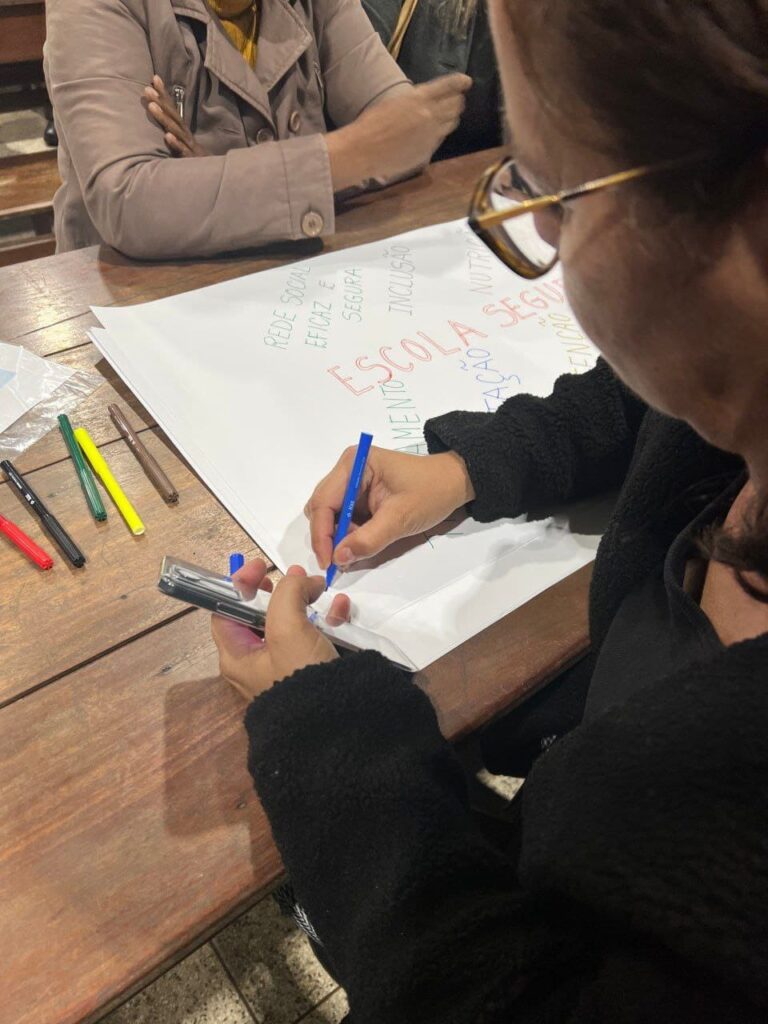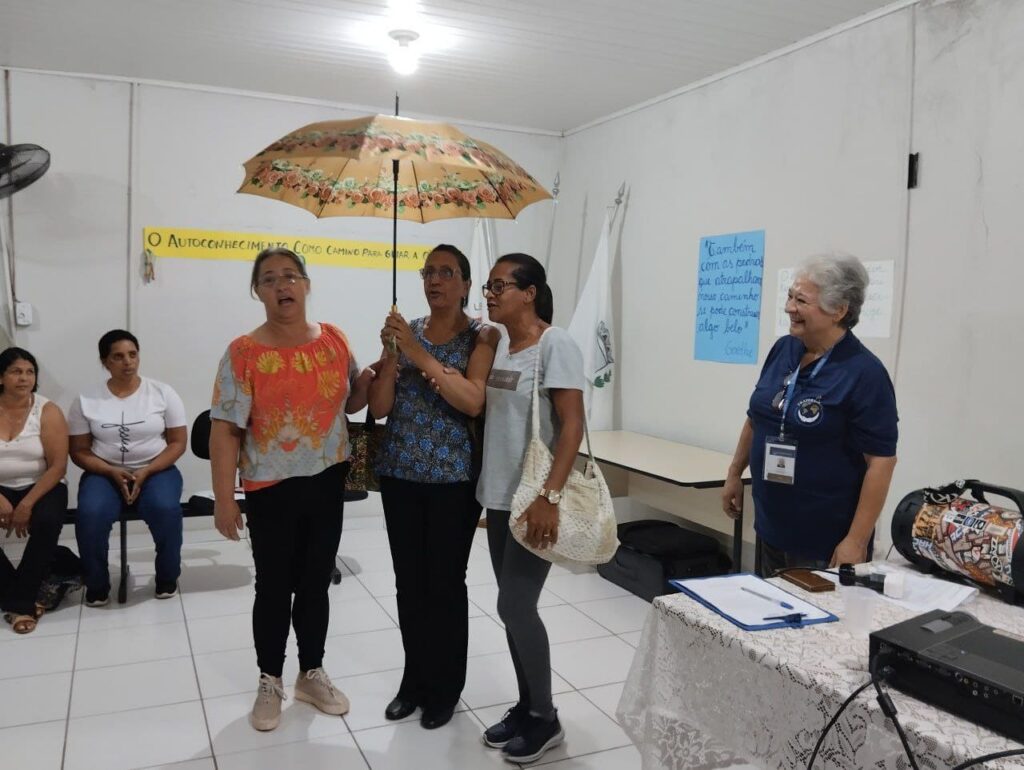The Fraternity – International Humanitarian Missions (FIHM) and the Inter-Institutional Network for Education in Emergency Situations (INEE) have developed a Joint Plan aimed at prevention and preparation for emergency situations in schools in the municipalities surrounding Carmo da Cachoeira, in the southern region of Minas Gerais.

The proposal for action by the Fraternity – Humanitarian Missions (FIHM)-INEE Brazil Focal Point began in 2022, with institutional contacts and active listening, and was deepened in 2023 by analyzing the specific demands of the territories, resulting in the development of two action plans: the Workshop Laboratories and the Support Plan for the Education Department in Carmo da Cachoeira, both based on the principles of the Minimum Requirements for Education in Emergencies and Minimum Standards of Protection.
The Workshop Laboratory aimed to prepare facilitators to work with themes such as the role of education in disaster prevention and risk management and actions in emergency situations and was aimed at these affiliates of the Fraternity – International Humanitarian Federation (FIHF): Figueira Light-Community, Youth for Peace Campaign, Aurora Light-Community, Hill Light House and Tibetan Park School.
The Support Plan for the Education Department in Carmo da Cachoeira consisted of training meetings involving five municipal schools, three in the urban area and two in the rural area, with the aim of strengthening the schools, promoting community participation and developing practical tools to help build a safe school environment, with strategies built in collaboration with managers, teachers and parents.


Fátima Cavalcante, a volunteer humanitarian actor and coordinator of the project, explains that “the attacks on schools that took place in many states of Brazil and also affected the south of Minas Gerais, made us think of the proposals of the Fraternity – International Humanitarian Missions (FIHM) – INEE Plan as a valid means of assisting the affected school communities. We also addressed other contemporary challenges, such as the impacts of the pandemic, the different forms of violence in schools and highlighted the importance of prevention and care for educators and family members to protect children.”
Based on these assumptions, the 15 training meetings, held from August to November 2023, emphasized the promotion of safe spaces and well-being, through simple strategies such as active listening, dialogue, art, music and dance, and were attended by 90 teachers and 50 parents, impacting around 300 people.
“This data shows that the plan has been successful in strengthening ties between teachers, managers, parents and schools, providing a safe environment for reflection, revision and reconstruction of proposals and actions to be put into practice in the day-to-day running of schools,” says Fátima.


Education for peace and the common good
The workshops held with teachers, parents and school managers focused on values-based education, addressing topics such as self-knowledge, environmental awareness and strengthening the protection network that encompasses family, school, community, city and planet, promoting global citizenship for peace and the common good.
Various art-education tools were used, such as short stories, dramatizations, poetry and songs, which stimulated reflection, self-expression and self-inquiry, creating a good atmosphere among the participants and promoting aspiration to the daily challenge of “know thyself.”


For the educators, the workshops highlighted the importance of their own growth and self-transformation as a means of broadening horizons in educational practice, with each person being an agent of change and inspiration for others.
Wilza Helena Oliveira Vilela, supervisor of the Dr. Moacir Rezende Municipal School, highlights the importance of the partnership with the Fraternity – International Humanitarian Missions (FIHM) in applying the Minimum Education Requirements. She points out that the partnership brought hope after the pandemic and allowed teachers to express themselves more calmly, promoting a fraternal environment. Wilza also points out the applicability of the activities experienced in the workshops, especially the interaction with parents, which brought a more open and emotional perspective, resulting in a more meaningful relationship between school and family.
“As well as exchanging experiences with teachers from other schools, the workshops also emphasized the need to maintain a happy school environment that values emotional well-being. These are essential factors for pedagogical success. The school must provide security and offer a welcoming and peaceful environment. This will also contribute to changing the mentality of our students,” says Wilza.

A refuge for children
A specific activity on child protection and safe schools aroused the enthusiasm of the participants, who recreated a difficult day at school, using resilience skills to turn risks into opportunities for growth.
Daily challenges and socio-emotional skills were worked on to promote self-reflection, self-awareness and expressiveness. This workshop addressed the school as a space where different challenges are reflected and how it can be a refuge for children.

Valéria Vieira, supervisor of the Municipal School Professor Wanderleia Aparecida do Prado Nascimento, emphasizes the relevance of the training and the practices experienced which, according to her, “brought a more playful and artistic look to the school environment.” The supervisor also mentions the importance of carrying out activities that involve human values and emotional expression and provide a more complete and effective practice.
“The workshops lit a warning signal, indicating the urgency of changing educational standards to include human values, arts, music and a fraternal experience at school. This is not separate from academic content, but is fundamental to the real development of the skills needed to face life’s challenges.”

She adds: “Transformation is not conscious, but it begins when we open ourselves up to it. This transformation helps us to build a culture of peace within the school, prevents problems and challenges and promotes well-being.”
This experience, according to Valéria, brought her joy and hope and awakened within her “essential elements that are often forgotten.” She says she is taking these lessons into her life, family and teaching practice.
“By dramatizing, questioning, reviewing and reconstructing everyday school life, the educators highlighted the importance of dialogue, effective communication and building and strengthening safety nets. The integration of teachers, parents, students, the community and support bodies has strengthened the school, creating a more welcoming and inclusive environment,” says Fátima.







